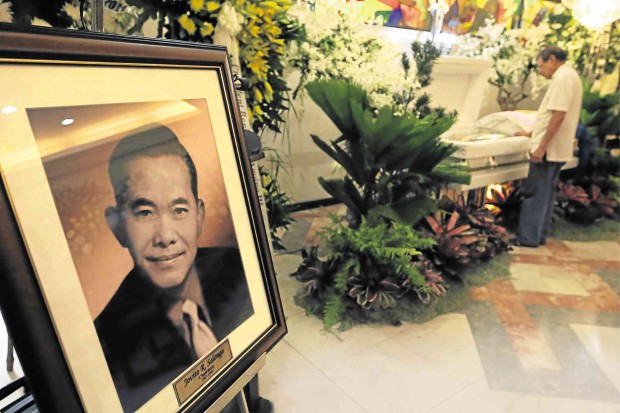Sans struggle, Salonga did not die as he lived

GOODBYE, DAD Esteban Salonga (right) views the body of his father, former Senate President Jovito Salonga, at Loyola Memorial Chapels in Guadalupe, Makati City. RAFFY LERMA
Jovito Salonga, the staunch oppositionist, statesman and former Senate President, died contrary to how he lived his life—without a struggle and with no unfinished business, according to his son, Steve, his primary “collaborator” in his various public service endeavors.
Salonga, who died at 95 at the Philippine Heart Center on March 10, had been suffering from a “debilitating” condition—Alzheimer’s dementia—since 2010, Steve revealed in an interview on the second day of Salonga’s wake at Loyola Memorial Chapels in Guadalupe, Makati.
READ: Blessing to nurse a good dad: Jovy Salonga
“It was quite peaceful. There was no struggle,” Steve said of his father’s passing.
The quiet death was a stark contrast to the way Salonga lived his life, at the forefront of “the struggle for a sovereign Filipino nation,” the son said.
“A legacy means there’s something that remains of a person. To me, what remains is that he was part of a struggle that started 100 years ago—the struggle for a sovereign Filipino nation—and [his death] ends that era,” said Steve.
“We’re looking at people like Claro M. Recto, Jose P. Laurel, Lorenzo Tañada, Jose Diokno,” he said, mentioning the names of the most prominent Filipino statesmen.
Steve even compares his father’s patriotic spirit to that of the great revolutionary general, Antonio Luna.
“He was a friend of every President, but also a critic to every President,” Steve observed.
Salonga retired from public service in 1992, but he “remained an activist, a critic of the government,” Steve said.
He channeled his advocacies into the civil society groups he established, the Kilosbayan and Bantay Katarungan (Justice Watch).
Never forgotten
One of the groups he founded was the Bantayog ng mga Bayani Foundation, which runs an eponymous monument in Quezon City, “to make sure those who died during martial law, those who were tortured, those students and teachers and nuns and priests [who fought against the Marcos dictatorship] will always be remembered,” said Steve.
“He understood people would probably forget those who fell during the night. He wanted to make sure people didn’t forget,” he said.
Steve, who is also a lawyer, now follows in his father’s footsteps as a public servant as he is now running for governor of Rizal province. He is running against a political dynasty, noting how strongly his father opposed political dynasties, having sponsored the antidynasty provision in the 1985 Constitution.
Asked if Salonga had died with any unfinished business, Steve answered: “He had enough time. He made sure everything was square. When you’re a lawyer, you take care of things. So, no. No unfinished business. He’s gone well beyond the business.”
Since the wake began on Friday, white standing sprays have started filling up the Premiere Suite at Loyola Memorial Chapels in Guadalupe. Flowers fill every corner of the room, and line the hallways outside.
Wreaths from President Aquino, Vice President Jejomar Binay and Chief Justice Maria Lourdes Sereno, among others, flank the flag-draped casket. An honor guard has also been standing by the casket.
Steve noted that most of the visitors at the wake so far were family, or “those whose lives were touched” by his father.
The President is expected to deliver a eulogy on the last evening of the wake. Masses will be said every evening until Tuesday. Interment will be on Wednesday at the Pasig Public Cemetery. TVJ
RELATED STORIES
Jovito Salonga’s son laments LP snub
Senators mourn passing of ‘patriot,’ ‘brilliant’ statesman Jovito Salonga